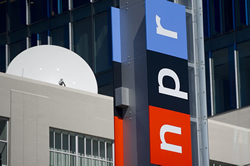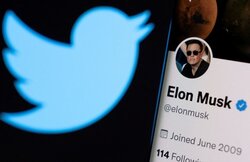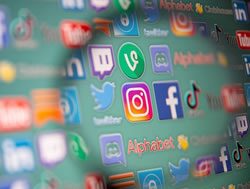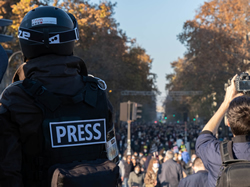Courtney C. Radsch says Twitter’s decision to label NPR as ‘Government funded media’ has implications not only for the network’s independence, but for the safety of its journalists on the ground.
 The initial decision by Twitter to label United States’ National Public Radio (NPR) as ‘State-affiliated media’, underscores the need to rethink the role of major social media platforms as critical gatekeepers in the public sphere.
The initial decision by Twitter to label United States’ National Public Radio (NPR) as ‘State-affiliated media’, underscores the need to rethink the role of major social media platforms as critical gatekeepers in the public sphere.
It suggests there is a need for better labels for news media, and the importance of insulating these designations from political interference or mercurial interventions by billionaire founders.
When Twitter placed a State-affiliated media label on NPR (it then changed it to ‘Government-funded media’ after a barrage of criticism) it put the award-winning public media outlet in the same category as Russia’s RT and China’s Xinhua News Agency.
It provided fodder to partisans around the world who would happily denigrate public service media by equating it with State-owned media.
On 12 April, NPR announced that it would no longer post on its 52 Twitter channels to protect its credibility, though its journalists are still able to use the platform for news gathering.
Figuring out which news media are propaganda or arms of the States that fund them, and which ones provide a public service and are insulated from editorial interference by the Government, has once again become a flashpoint.
It intensifies the debate over content moderation and discrimination on social media — not long after major social media platforms began instituting labels on some media accounts.
Democratic Senator Ron Wyden called it “an insult to the notion of a free press to conflate an editorially independent non-profit organisation like NPR with State-controlled propaganda mills” in Russia and China.
Meanwhile, Republicans, who have long pushed to defund NPR and object to its public interest mandate, cheered the new label.
In an apparent response to the outcry, Twitter established — at least for now — a new ‘Government funded’ label on both NPR and British Broadcasting Corporation (BBC) accounts, despite the fact that less than two per cent of their budgets come from public funds.
This term is equally misleading, since many news outlets around the world receive Government funding through subsidies, State advertising, and emergency relief during the pandemic.
In Canada, for example, the Government has provided millions of dollars directly to media outlets through cash infusions and tax breaks.
The US and Europe support public interest media around the world through overseas development assistance, providing critical State funding to media working in challenging conditions.
In these and other examples, does that make them either State-affiliated or Government-funded?
The terms ‘State-controlled’ and ‘Government-funded’ raise questions about the utility of employing such blunt terms and not including information about how other news media are funded and operate.
The selective application of labels to some news media and not others also raise concerns about perception and consistency.
Public media outlets such as NPR, are editorially independent, provide transparency into their budgets, masthead, and editorial processes.
They publish their standards and provide corrections when necessary.
The fact that these outlets receive some funding from the Federal Government does not make them ‘State-affiliated’ in the same sense as outlets like RT and Xinhua, which are fully State-funded and provide minimal transparency.
Media outlets like NPR and the BBC are better characterised as public interest and publicly funded media.
Efforts to categorise news media are not only about labels; they also impose restrictions on advertising, targeting, and algorithmic amplification.
Twitter’s move to reclassify NPR directly impacts its reach, since Twitter’s policy states it “will not recommend or amplify” accounts that receive the State media label.
Shadow banning tactics, which suppress the reach of a social media account without outright deactivating it, can also affect the visibility and monetisation of its news content, with implications for news media sustainability.
Media outlets care about the label they get. Al Jazeera, which was originally labelled as funded by the Qatari Government, lobbied successfully to persuade Facebook it was editorially independent and shouldn’t get a label.
Senior Vice President Business Development and Growth,Digital Division at Al Jazeera, Michael Weaver said the reason it objected so forcefully was because perception was reality in the world in which we live.
“If we’re being undermined by other platforms, it spreads across not only what Al Jazeera is doing, but it spreads across all these geopolitical conflicts that are happening. It could be a death blow to the network,” Mr Weaver said.
The risks of conflating editorially independent outlets with State-controlled propaganda mills not only detracts from the media and information literacy goals of such labelling, it also undermines the safety of journalists working for the outlet.
Labelling independent public interest media as State-affiliated provides cover to authoritarian Governments to designate those organisations and their journalists as foreign agents or spies, which could have significant implications for their safety.
In this sense, NPR’s decision to withdraw, at least partially, from using Twitter sends a principled message that will help insulate its reporters in the field from backlash.
Ideally more media outlets, including the BBC which now has the same label as NPR, would consider doing the same and break out of Twitter’s stranglehold on journalism.
*Courtney C. Radsch is a Fellow at the University of California Los Angeles Institute for Technology, Law, and Policy.
This article first appeared on the Brookings Institute website










